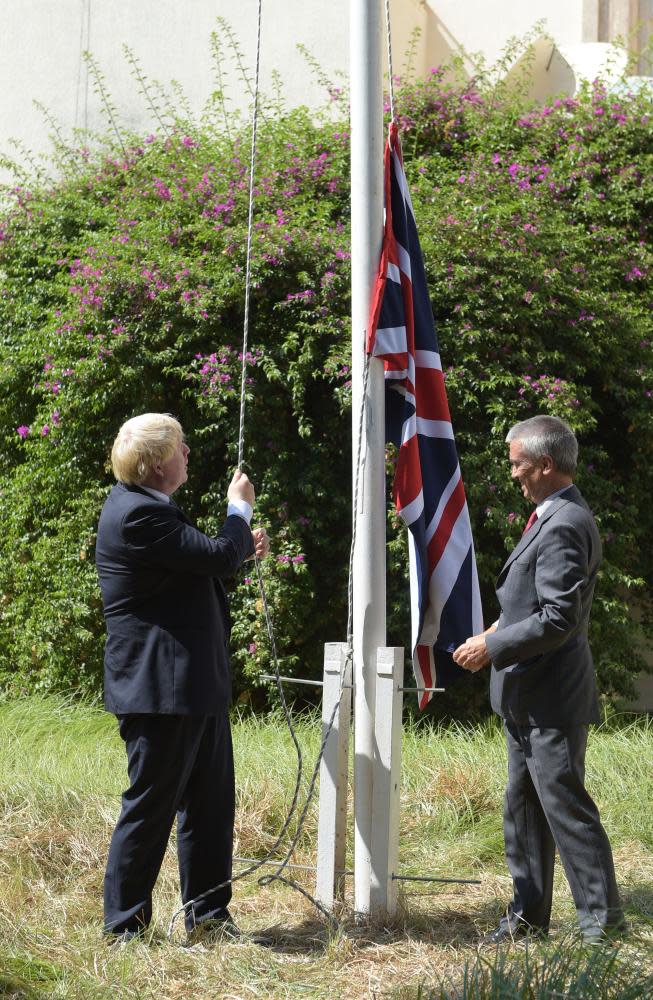Britain sends £9m to Libya to fight terror threat and migrant crisis

Boris Johnson has announced a £9m aid package for Libya to help deal with the problems of migrants risking their lives trying to cross the Mediterranean and a growing threat of terrorist groups from the war-stricken country.
The foreign secretary announced the extra funding as he made his second trip to Tripoli in just four months, where he visited UK naval officers training the Libyan coastguard in search and rescue.
The country has been in crisis since the ousting of Muammar Gaddafi in 2011 by rebels and a Nato-led bombing mission backed by David Cameron, which a committee of MPs have since described as an ill-conceived mission that helped fuel the rise of Islamic State in north Africa.
Johnson visited Tripoli in May to meet Fayez Al-Sarraj, head of Libya’s UN-backed unity government, but undertook a second trip on Wednesday to announce extra UK funding to help stabilise the country.
During the trip, he described Libya as “the front line for many challenges which, left unchecked, can pose problems for us in the UK – particularly illegal migration and the threat from terrorism”.
He added: “That’s why it is so important that we work with the Libyan government and our partners to help bring stability to Libya, stopping it from becoming a fertile ground for terrorists, gun runners and people traffickers in close proximity to Europe.”
The latest money includes £4m to remove improvised explosive devices from areas where Isis have been pushed back, another £1m towards a fund for critical infrastructure, £2.75m for supporting women’s participation in peacemaking and £1.3m in support for food and healthcare for refugees.

Before the foreign secretary’s visit, Sarraj warned that would-be terrorists could be entering Europe among the tens of thousands of migrants crossing the Mediterranean each year.
But Fionna Smyth, Oxfam head of humanitarian campaigns, said it was wrong for the UK to back a solution of turning people back to Libya when they were trying to flee.
She said it was “disturbing that Boris Johnson is talking about preventing people who are fleeing violence and destitution at home from leaving Libya”.
“Research we conducted with people who fled through Libya found that all but one of the women questioned had suffered sexual exploitation and three quarters of people had witnessed murder or torture,” she said.
“Aid for people travelling through Libya is welcome – but Britain should be helping them to find safety, not trapping them in a country where they face violence and abuse.”
The collapse of the economy and oil production has led to political vacuum in which extremist militia groups have proliferated and tens thousands of refugees have tried to cross the Mediterranean to Europe.
The country’s political landscape is also divided into two factions, with Sarraj controlling part of the country and his rival, Khalifa Haftar, dominating other areas. But the two men have agreed to work towards fresh presidential elections by March.
Johnson also visited Tunisia on Tuesday evening for talks with Ghassan Salamé, the new UN special representative on Libya, who has been brought in to help break the political deadlock.
While in Tunis, he met senior members of the Tunisian government after the UK’s decision to lift its advice against travelling to most of the country. The guidance was put in place after the terrorist attack of 2015 in Sousse, where 30 British holidaymakers were among the 38 victims.
After visiting the Bardo Museum, which was also subject to a terrorist attack in 2015, Johnson said improvements to security in Tunisia had allowed the UK to change its travel advice.
“The UK is a steadfast partner for Tunisia in building its prosperity and security, and combating terrorism, and I look forward to even stronger ties between us,” he said.
The country, which used to be a popular tourism destination, remains in a state of emergency after a suicide attack on a police bus in November 2015.
The Foreign Office continues to warn that terrorists were still likely to try to carry out attacks in Tunisia and that people should remain vigilant, especially around religious festivals and sites.
It also continues to advise against all but essential travel to the south of the country and warns against any travel at all to areas close to the border with Libya and some it shares with Algeria.

 Yahoo News
Yahoo News 
